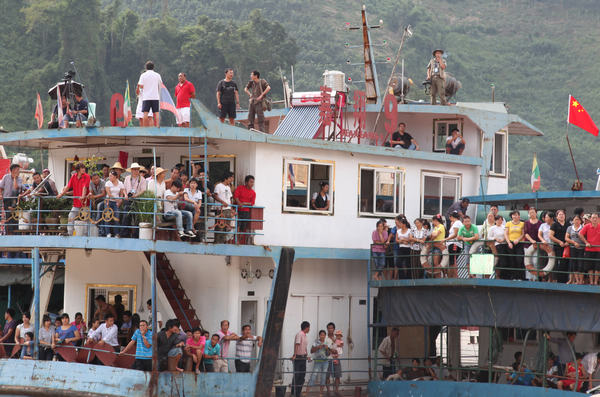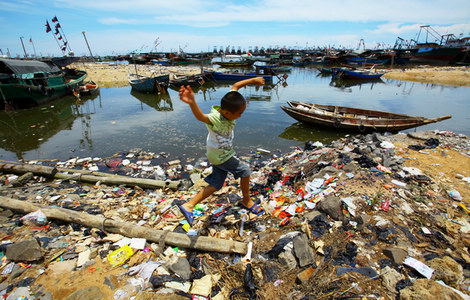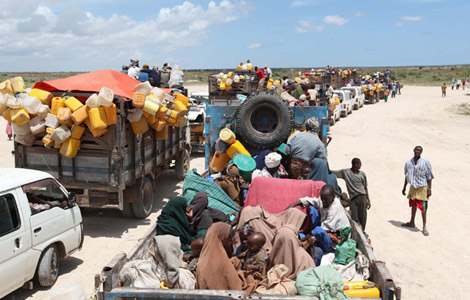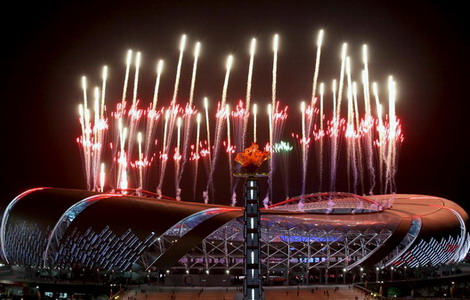|
|||||||||||
|
 |
|
After being stranded in northern Thailand for more than 10 days, 11 cargo boats with 78 sailors on board, escorted by armed Chinese police, safely return to Guanlei Port in Southwest China's Yunnan province on Sunday afternoon. [China Daily] |
GUANLEI, Yunnan / BEIJING - The Jin Shui 12, one of the 11 cargo boats returning to China from Thailand after the horrific attack on the Mekong River on Oct 5, dropped anchor at 3:40 pm in Guanlei Port, Xishuangbanna, Yunnan province, on Sunday.
About 30 ships waiting at the port blew their horns in a spontaneous welcome while the crowd at the port lit firecrackers to greet the ships.
The Jin Shui 12 was among 26 ships stranded at Chiang Saen port in northern Thailand after the attack against two Chinese cargo ships on Oct 5.
Twelve Chinese sailors were confirmed dead and one missing after two cargo ships, the Hua Ping and the Yu Xing 8, were attacked and hijacked by an unknown group of armed men on a section of the Mekong River that forms the border of Thailand, Laos and Myanmar.
Shipping on the river was suspended, stranding 164 crew members from 26 ships in Chiang Saen. In an emergency response, the Chinese government sent a patrol ship on Oct 13 to escort the boats and the sailors home.
Meanwhile, the relatives of the dead sailors also went to Chiang Rai, where the dead bodies were being kept. The relatives returned on Oct 14.
In the returning convoy, 78 sailors and 11 ships came back under the escort of the Meng Le, a Chinese patrol ship.
The Meng Le had carried 29 police officers to Chiang Saen, and its captain, Peng Min, told China Daily that he and his crew did not sleep for more than 48 hours so that they could all remain on watch during their trip back.
"We blew the horn when sailing through regions which showed signs of potential danger," Peng said.
Sun Xiaocun, captain of the Jin Shui 12, expressed his joy at returning home and thanked the motherland, adding that he felt relief at the sight of the Meng Le arriving in Chiang Rai, Thailand.
"We hope the traffic on the river can resume as soon as possible," Sun said.
The Hua Xin 6, another of the returning ships, had met the two attacked cargo ships at 9:40 am on Oct 5, according to its captain, Li Tianming.
Li said his ship blew its horn at the two ships but received no response. The crew members on the Hua Xin 6 retrieved bodies, which they identified as Chinese, drifting along the river on the day before the other ships there launched a search for bodies.
"We were so sad because we know them so well," said Li.
Thai-Chinese trade in Chiang Saen came to a halt after the Oct 5 attack.
About 110 Chinese cargo ships work along the Mekong River.
The ships anchored in Guanlei Port have granted two-thirds of their crew members permission to go home, while the rest are staying on board with their captains with no idea about when they can resume their work on the Mekong River, said Zhu Jinfu, a 20-year-old sailor working at Guanlei Port.
The cost for the ships docked in Guanlei Port is mounting, according to Wu Dechang, captain of the Zhong Sheng. Wu said it costs about 30 yuan ($4.70) a day to keep his ship in the port and a crew of seven is paid 12,000 yuan in total in a month.
Sun, the captain of the Jin Shui 12, who has been running his shipping business for 17 years, said he will have to shift to another business if bilateral trade cannot resume soon.
"I have no choice but to get used to it," he said.
Wu said that the stranded Chinese sailors also need therapy after their traumatic experience in Thailand. He also said neighboring countries on the Mekong River should mobilize more security patrols to protect sailors and shipping.
The other 15 Chinese ships are heading to Guanlei Port and will arrive there soon.
Xinhua contributed to this story.
Related Stories
Sailors stranded in Thailand return to China 2011-10-14 10:30
12 confirmed dead on Mekong River: FM spokesman 2011-10-11 22:07
Boats attack in Mekong River kills 11 Chinese 2011-10-10 06:15
Hot Topics
Libya conflict, Gaddafi, Oil spill, Palace Museum scandal, Inflation, Japan's new PM, Trapped miners, Mooncake tax, Weekly photos, Hurricane Irene
Editor's Picks

|

|

|

|

|

|







